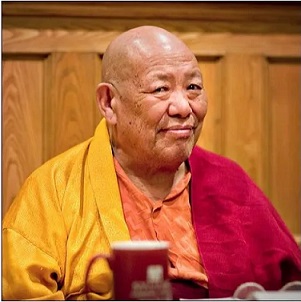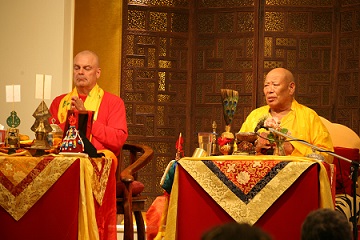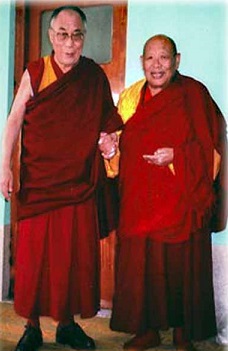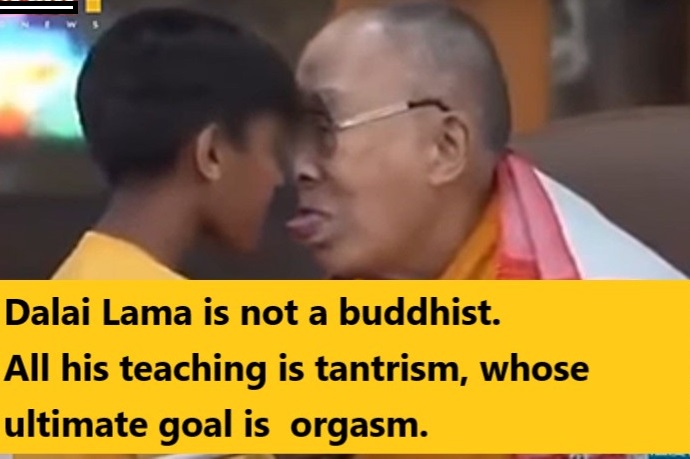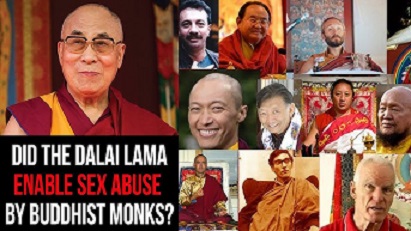| Home » 文章分类_English » Reports of Tantric Victims |
The Story of My Rape By Lama Wangdu - His Accomplices Drugged Me First(Frank Report) |
I am writing for the first time, the story of how Wangdulama Rinpoche raped me. Of all the things to talk about, this is one of the hardest. It was shocking and sneaky. It’s hard for me to grasp - even to this day. In my first article, I wrote about the Movement Center, but I did not write about my rape. Before I talked to Frank, less than three people knew about this. But I’ve been waiting long enough. Waiting and preparing for this day. I feel deep sadness from this crime. I also feel a fair amount of worry, doubt, confusion, and embarrassment because the perfect recollection of events was stolen from me, because I’m certain I was drugged. Worst of all, I didn’t know I was raped and drugged until I left the cult. I was so naive. I didn’t even know what a roofie was. I didn’t know what the different effects of being drugged were. I didn’t know you can be drugged by one person, who then brings you to the rapist at a second location. I thought I had a spiritual experience, and that’s why I couldn’t say no. I thought I consented, because I walked there myself. And there are significant things I don’t remember, literal black spots. I don’t remember when it was. Although I’m pretty sure I’ve narrowed it down to a window of time.
I was a member of the Movement Center for ten years. I think part of my lack of certainty about the date is that when I lived and worked at the ashram, I lived an extremely isolated, simplified, and repetitive life.
I was completely under the control of this cult, and I did what they told me to do, and meditated and ate, every day at the same time, day in, day out. No vacations. No trips. No meeting with friends. I had no friends there. I lived in as much isolation as I could, because I learned fast that talking to anyone was dangerous. The only thing that changed in my monotonous experience was holidays, the “gurus” birthdays, and retreat weeks. This is part of why I don’t recall when it happened. All my days blurred together.
Ruth Graham At the time the rape happened, I didn’t have a car. I didn’t leave the ashram for months at a time. I was also celibate. I had no libido. I thought I was asexual. This is another reason I can tell you I was raped. I would not have said yes if I could say anything to anyone. Another thing I feel guilty about is that I lived at the ashram for a year or more after this happened before I started to question things and mentally and physically prepare myself to leave. I now know that I was doing something many people do when they are subject to years of extreme high-control groups. You ‘self-edit’ yourself to the point where you compartmentalize your trauma, so none of your emotions peek through to your abusers to use against you. You basically force yourself to normalize abuse. You ‘memory hole’ yourself. By succeeding in not feeling your pain because you self-edit your own mind, you don’t have to be vulnerable to anyone who will see it as an opportunity to bully or triangulate you. Examples of this type of dangerous emotional vulnerability in this shit-hole cult would be: (a) crying during a meditation class (b) looking distraught or scowling while walking down the hall (c) being irritable at work while experiencing a severe after effect of an assault.
Moni ONeal and J. Michael Shoemaker. Or anyone who had to attack someone else on a particular day because they themselves feel insecure.
In fact, one of these memorable incidents for me was when Moni (Monica O’Neal or “Moan I” as I would secretly call her in my head) bodily cornered me one day at the base of the service stairwell (the stairwell used most by kitchen workers, furthest from Shoemaker’s apartment) at the compound and yelled venomously, “You need to open your heart chakra, Ruth! It’s completely closed!” I think I yelled back something, but I don’t remember what it was. This is one of those incidents I feel weird about. I felt betrayed, and sad. Like if you’re falling into a dark place that you will never get out of. Why? Because this was mere weeks after I endured another sexual assault, right at the end of my stay there. Maybe I will share that later publicly. Like everything else at that ashram, nobody had sympathy for anyone about anything. I was just sexually assaulted, and the care I got was being yelled at that my heart chakra wasn’t open enough. Did anyone bother asking, “Are you okay?” or offer a hug? Or ask, “Is there anything I can do for you today?” Nope, that’s not how compassionate wisdom works at that place. The compassion and wisdom work like a Chinese factory or a Russian gulag. Everyone for themselves. It’s because of Jessica Becker that I have now learned that this type of abuse is called spiritual bypassing. Spiritual bypassing is when a person attacks you for normal emotions, thoughts, or doubts you have or are presumed to have, and then that person makes you feel like your “sinful” or “lower” inner state is something that you need to be afraid of, or ashamed of, or guilty for. Like someone accusing you of having lustful thoughts or being possessed by demons. Sometimes such people can approach you with this as if they were your friends. In a sickly-sweet way, they teach you to cut out your own healthy responses to trauma. It’s a horrible form of abuse, and I was subject to it at that ashram for years. Rape I was raped, but it was Wangdulama’s rape of me. It’s his and his assistants to own, not mine. It was his rape. Of me.
In the morning, I went to work in the kitchen. I was making dinner for everyone. I worked there usually for eight or more hours a day. I would start at 9:00 am and work until 12:30 pm. Then I would go back from 2:00 pm to 6:00 pm. These were the same time blocks every day for years, with no days off, no vacations. One person often did the morning shift of cooking. It was all the “prep” for the actual cooking. I prepared the ingredients to be used. I cleaned, cut, measured, peeled, and did light cooking, like slow cooking beans or boiling broth. I enjoyed working alone. I could listen to my own music or work in silence. However, one could never be sure if someone important would come to the kitchen. I was always on guard. On this day, sometime in 2011, I think, I had an unusual pair of visitors.
However, these two girls would not ever really talk to me, so this was a very unusual thing. They didn’t really approach me. We would sometimes share space during “seva” (service) days (sometimes they’d help us make Tibetan ‘momos’ or dumplings in the kitchen) or ceremonies/special events, but they didn’t show interest in me, and neither did I show interest in them. I never hung out with them. We lived in different worlds. But one day, as I worked alone, after I was almost done with my prep work (I remember I was finishing early that day), they appeared. Just for me. They came up to my workbench alone and were talking to me and asking how I was.
I was happy about it because I was lonely. I was deeply depressed and lonely, but I knew it was safer to be alone. I think they were both dressed in their traditional clothes. So, it was odd to see them in the kitchen in fine embroidered silk shirts and skirts. One of them asked me, “Would you like some tea?” This was odd. None of them ever offered me anything before. I think I said I didn’t need it because I had already had my morning cup of black tea. But they seemed insistent, so I relented. They asked me what type I wanted, and I said “black.” And they both left to get it. The place to get tea, or “tea station”, as it was called, was one floor up on the main floor. A large selection was always available to all residents. I don’t know if this is where they got it, but I assume they did. After a bit, they came back down and handed me a cup. I noticed it was lemon ginger tea, not black tea. I thought this was an issue of a language barrier and nothing more. I was too afraid to even joke that they got it wrong, so I accepted it. And started drinking it as they watched. I think they hovered for a bit more and then left. All in all, it was awkward. I don’t remember them having any meaningful conversation with me, but at the time I can say I suspected literally nothing. Just was weirded out that they got me a type of tea I don’t even like much. Less than an hour later, I finished my prep work. I can honestly say I felt euphoric, but not weird. I attributed my euphoria to having a conversation with real people, which was rare for me in that place. In retrospect now, I know better. The conversation was exceedingly awkward. Their English was rudimentary. They watched me weirdly. It’s strange how I remember events leading up to it, but nothing after. On that day, I wasn’t scheduled for the afternoon cook, so I went to find Jim (who ran maintenance at the time) to ask him if I could have some maintenance work hours (to pay my “tuition”). Jim is a micromanager type of person. On that day, he was uncharacteristically brisk with me and commanded me to just “go outside and find something to do. I don’t care.”
. People who know Jim know I’m telling the truth. So, in a state of increasingly bizarre lightness, I went outside to try to find something “to do.” I decided on a patch of weeds around the semi-circular maintenance drive near the service entrance, near the main kitchen. That drive was where all the garbage was kept. It was on the east side of the property. The Swami’s apartment, and the main entrance, were on the west side. I remember kneeling down to do weeding in a bushy area and feeling suddenly confused. Like my brain stopped processing tasks. Yet simultaneously, I felt happy and giddy. So, I just kind of thought “oh okay” and decided to do my work nice and slow, because it was a cool, semi-cloudy day. I couldn’t do much at all, so I remember at one point looking up and thinking “am I okay?” I remember thinking it was a stupid place to weed because there were no weeds, but I tried to weed a weedless patch of grass. And I was a little worried because I felt dizzy after a time, but I remember thinking “well, at least I feel good for once!” Maybe five minutes later (not sure about my recollection of time at this point) the two Tibetan girls appeared. I say girls, but they were in their 20s like me. I remember my vision was starting to be weird at this point. The two Tibetan girls said, “Come with us. Wangdula wants to see you.” I got up and followed like I was high on nitrous oxide. I remember as I walked with them, one on either side of me, thinking “oh is this why I’m so happy? Is it because of the energy of the guru calling to me?” Right now, I feel a lot of grief just typing this. How stupid was I? So, they walked me along the outside grounds, to the west, and out of the ashram grounds. This was a long walk, and this is where my memory starts to get spotty. I do remember my vision was streaky. I thought I was seeing auras. I saw halos of green and purple around the tips of the trees, and the figures of the girls were static and glowing. I figured this was an aura, like how my vision would go blurry during open eye meditation class. I learned to be passive around strange behavior, or experiences. I was a well-trained donkey. They walked me to the Tibet house, a little house outside the Movement Center grounds, less than a block away. I don’t remember which route I took. I remember just walking outside the gate, and then being there. I remember walking into the small cottage and being ushered to Wangdulama’s room. He wasn’t there, but there was a bed. It was a tiny room with a tiny bed. The walls were covered in bright tapestries and the bed in colorful quilts. I remember being asked to take my clothes off. I don’t remember how my clothes came off. I think the girls took them off me. I don’t remember being able to register that it was a strange request at all.
It was like I was enveloped in giddy fog. Yes, a tiny part of me thought “well this is weird”, but it couldn’t come to the surface. I don’t remember how I got onto the bed. I remember lying naked like a doll on it, spread eagle sideways with my legs practically falling off. I don’t remember how I got there. I remember feeling extremely giddy, and my vision was streaky. None of it felt meaningful, though. I guess at that point I was too far gone to register fear or anger. I remember he was clothed, but just flipped his monk’s robe to the side. He tried to penetrate me, and did, barely, but stopped because he couldn’t get hard. I remember him smacking his lips at me grossly the whole time. I don’t remember if the girls were there in the room with me the whole time, but they were there at a certain point to translate for me. He said (they translated, and I paraphrase because it was broken English): “You can get your clothes on, don’t ever tell anyone this happened or something very bad spiritually will happen to you.”
They might have asked me “Are you okay?” right before they left me alone. I remember nothing else of that day or the days after. I’m pretty sure I did nothing for the rest of the day. Nobody checked on me. That didn’t happen there. I might have gotten in trouble for not doing my “hours.” I don’t remember. All I remember from that time is that I thought I had consented and had a “spiritual experience.” In fact, I felt deep shame over time because I couldn’t imagine how I consented to that. What came over me? That wasn’t me. But I must have. Those two girls never ever approached me again after that. And I also instinctively avoided them. I don’t think I met with Wandgulama again after that either. Now I know what happened to me and that it wasn’t my fault. Now I know why the girls came to see me. Why they offered me tea, why they gave me lemon ginger, maybe, to hide the taste of whatever it is they gave me. (Scopolamine maybe? Some combination of things, like Valium or oxy with something else?) Now I know why they came and found me after a certain time afterward; why my vision was streaky too, and why I was giddy, light-headed, then in a fog, then missing time. It makes sense why they escorted me all the way back to my room, arm in arm like they weren’t sure I could walk, yet never asked for permission to hold me. Why did they threaten me that something bad would happen if I told? It’s because I was raped. Two girls drugged me, trafficked me to another location, and I was raped. I realized this, my god, like four years after I got out of that place. Who else has been attacked this way? I think what was sad for me is that I learned that sometimes women traffic other women for men. I still had a lot of doubts, but I have fewer now. I trust my memory. I’ve never been a drug addict. I was sober and working at the time they attacked me.
It’s hard to admit that I was groped in the buttocks by both, when I first moved into the cult, at 19. I was a vulnerable teenager, and I froze and didn’t know how to say no. Of course, I hated it, but at my age, I was so normalized to abuse like this from other teenage boys and adults. However, neither Shoemaker nor Wangdulama made any further moves on me as they did on other girls until this happened to me years later. I hope nobody else was assaulted like me. I was robbed of my natural instincts because I was drugged. I will probably never know the true story of what happened, like what I was given to drug me, who took part in it exactly, and what planning went into it. But I will say this, because of other survivors coming out, I feel ready to try to make sense of what happened to me, and to own publicly that I survived this coordinated assault. I am a survivor. I’m not afraid. If Shoemaker and his lackeys have nothing to hide, why is it that we the survivors are the ones being open about what really went on, while they threaten defamation, legal action, and bad karma, and shredding their documents simultaneously? Why are they resorting to trying to say that a history of childhood trauma or addiction is an effective bludgeon you can use to defend yourself from the truth? It’s because we are in the right, and they are in the wrong. And we know it. And they know it. Thank you to all the other survivors I’ve spoken to or whose stories I’ve read. We deserved better. It was not our fault, and we can heal. And I will have more to say later. August 8, 2022 https://frankreport.com/2022/08/08/the-story-of-my-rape-by-lama-wangdu-his-accomplices-drugged-me-first/ Frank Report
|
| Home » 文章分类_English » Reports of Tantric Victims |

简体 | 正體 | EN | GE | FR | SP | BG | RUS | JP | VN The Truth of Tibetan Buddhism Home | GUEST BOOK | LOGIN | LOGOUT
- Reports of Tantric Victims
- Chinmoy-Abuse
- Journal of True Enlightenment
- Criminal Dalai Lama and Tibet – Force
- Criminal Dalai Lama and Tibet – Sexual Practice
- Criticism of Force
- Criticism of Dalai Lama
- Criticism of Lamaism
- Criticism of Sexual Practice
- Recommendable books
- Roach-Event
- Samyukta-Agama Sutra
- Swami-Abuse
- True Face of the Dalai Lama
- True Heart News
- True Meaning of Sutras
- True Wisdom of Buddhism
- Truth from Insider of Lamaism
- Behind the Facade of Tibetan Buddhism
- The Secrets of Tibetan Buddhism
- Ole Nydahl-Event
Before Buddhism was brought to Tibet, the Tibetans had their believes in "Bon". "Bon" is a kind of folk beliefs which gives offerings to ghosts and gods and receives their blessing. It belongs to local folk beliefs.
In the Chinese Tang Dynasty, the Tibetan King Songtsän Gampo brought “Buddhism” to the Tibetan people which became the state religion. The so-called “Buddhism” is Tantric Buddhism which spreads out during the final period of Indian Buddhism. The Tantric Buddhism is also named "left hand tantra" because of its tantric sexual practices. In order to suit Tibetan manners and customs, the tantric Buddhism was mixed with "Bon". Due to its beliefs of ghosts and sexual practices, it became more excessive.
The tantric Master Atiśa spread out the tantric sex teachings in private. Padmasambhava taught it in public, so that the Tibetan Buddhism stands not only apart from Buddhist teachings, but also from Buddhist form. Thus, the Tibetan Buddhism does not belong to Buddhism, and has to be renamed "Lamaism".

